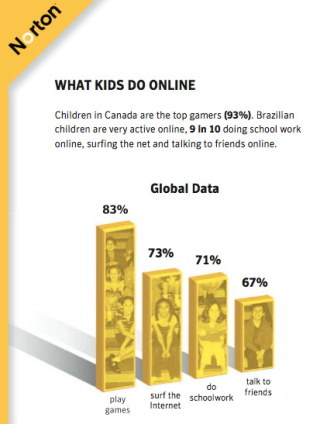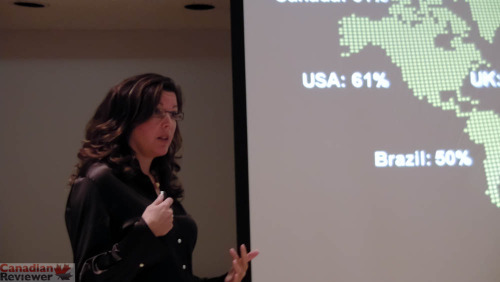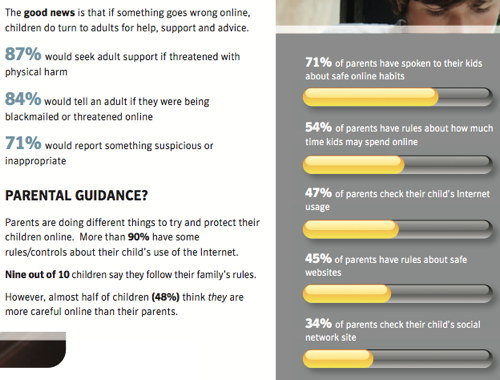 The Internet can be a scary place and as social networking and online gaming become more common, personal privacy, online safety and its effect on children is an increasing concern. A recent study of 2,800 kids worldwide from Norton revealed that children and parents need to be more aware of what's out there and how to deal with it.
The Internet can be a scary place and as social networking and online gaming become more common, personal privacy, online safety and its effect on children is an increasing concern. A recent study of 2,800 kids worldwide from Norton revealed that children and parents need to be more aware of what's out there and how to deal with it.
The Norton Online Family Report released recently, is a good reminder for parents to plug in to their kids’ online lives, if they’re not already – especially with kids spending an average of 10 percent more time online per month than last year. Parents were unaware of their children's online habits or the real amount of time spent on the computer, this is starting to change.
 Lynn Hargrove, director of consumer solutions for Norton: "Only 45% of parents are aware their children are having negative online experiences.""Over the past three years, Norton has examined the gaps between parents and kids with respect to their online beliefs and behaviors. With this year’s report, Norton also looked at the emotional impact of online experiences on kids and their online codes of conduct," explained Lynn Hargrove, Norton's director of consumer solutions for Canada.
Lynn Hargrove, director of consumer solutions for Norton: "Only 45% of parents are aware their children are having negative online experiences.""Over the past three years, Norton has examined the gaps between parents and kids with respect to their online beliefs and behaviors. With this year’s report, Norton also looked at the emotional impact of online experiences on kids and their online codes of conduct," explained Lynn Hargrove, Norton's director of consumer solutions for Canada.
Norton went straight to the source, surveying 2,800 kids and more than 7,000 adults in 14 countries about their online lives and experiences. The resulting study, the Norton Online Family Report, was conducted by research company StrategyOne and examines kids’ actual online experiences compared with parents’ assumptions – with some surprising results.
 Cyber safety expert Rob Nickel says kids aren't fully aware how easy it is for predators to target them online
Cyber safety expert Rob Nickel says kids aren't fully aware how easy it is for predators to target them online
In 2008, Norton found that kids reported spending nearly 10 times as much time online as parents realized. In 2009, the gap shrunk to kids reporting being online twice as much as parents realized. This year, kids and parents are fully in sync about the about of time kids spend online – closing one major gap.
Parents Aren’t Clued In
However, only 45 percent of parents realize their kids are having negative experiences. While parents are generally aware of the activities kids participate in online, they underestimate the extent to which kids download music and videos, activities in which kids may be exposed to inappropriate content and encouraged to disclose personal details.
Cyber safety expert Rob Nickel was brought in by Norton to shed light on his experiences in promoting online safety and awareness to students. He mentioned that cyberbullying - which can be harassment or humiliation online, is a real growing problem that parents are often unaware of.

The Good News
Kids actually want more parental involvement in their online lives. In addition to relying on their parents if something bad happened online, nearly nine in 10 report they follow family rules for Internet use. In addition, most kids say they have online manners: nearly seven in 10 say they don’t bully and aren’t mean to others online, over six in 10 say they don’t harass or stalk others online, and nearly six in 10 refrain from passing on embarrassing photos or posts about others. More than half wouldn’t do or say anything online that they wouldn’t do or say off-line.
New Tips for Parents
While kids are aware of many common sense rules for staying safe online, the old rules are not enough to keep up with the fast-changing online world. In addition to talking to kids, keeping security software up to date and using tools specifically designed for kids’ safety, parents can improve kids’ online experiences with new tips that combine technology and communication.
Prepare your kids for good or bad experiences online – don’t wait until after something happens. Highlight the importance of thinking before clicking and downloading. Use a search advisor to help identify if a website is safe versus unsafe.
Key Canadian Findings from Report
Although the majority of Canadian parents say they have house rules in place surrounding their child’s use of the Internet (69 percent), only 42 percent have actually set parental controls on their family computer.
Only 49 percent of parents in Canada think their child has experienced a negative online situation, while 61 percent of Canadian children reported that they have.
83 percent of Canadian children say they follow their family’s rules for Internet use. · Kids’ own rules/etiquette for being online revolve around not bullying or being mean to others online (80 percent), telling a parent/teacher/guardian if they are being bullied or harassed online (77 percent), and telling a parent/teacher/guardian if they suspect someone else is being bullied or harassed online (72 percent).
Canadian kids are not following some common sense rules: 59 percent are not using complex passwords and changing them regularly, 58 percent are not wary of pop-up banner ads, and 53 percent are trusting online offers at first glance.